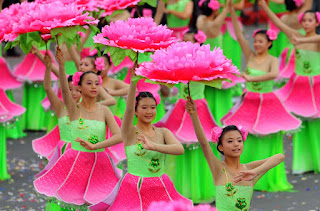 |
| The Presidential Office in Taipei |
Decades of relative stability and lack of drama in the Taiwan Strait have made it possible for ‘experts’ to get away with laziness
Recent events have convinced me, more than ever, that the “status quo” that has prevailed in the Taiwan Strait for more than two decades has stultified otherwise sharp minds, making it less likely that the solutions necessary to address the complex problem of Taiwan’s future will emerge.
Taiwan’s situation — only 23 smallish official diplomatic allies, an awkward existence as officially unofficial with others, claimed by China as a province — is as complex as it is fascinating. But its struggle has gone of for so long without resolution or even high drama that its people’s future is easily ignored by a large segment of humanity. As a result, only a small group of individuals, including lobbyists, officials, academics, journalists, bloggers, can be said to be keeping the flame alive on the international scene.
Unfortunately, many of those individuals, noble intentions notwithstanding, have also fallen victim to the calcifying effects of the so-called “status quo.” Lack of interest abroad in the problem, added to the absence of dramatic developments, have transformed the narrative into one of facile “us versus them” generalizations, pitting the pro-independence green camp against the “alien” and “pro-China” blue camp within Taiwan. That narrative finds sustenance in history, with the blue Chinese Nationalist Party (KMT) acting as a colonial power invading Taiwan and repressing the native Taiwanese. Rarely, however, does the storyline change. As a result, the perception of today’s KMT remains in essence one of an alien and nefarious party, while the green camp’s existential battle continues to be regarded from the perspective of the victim, forever crushed under the heel of much more powerful and invariably satanic forces.
Given the general lack of interest among the media and within government agencies worldwide, the so-called “experts” and lobbyists who perpetuate such interpretations of the situation usually get away with it. This lack of curiosity, plus the absence of drama in the Taiwan Strait, has made it possible for some advocates to become lazy. They won’t get caught if they are dead wrong, or fail to do their homework, or claim to “know” Taiwan, without having lived here for years or visited frequently enough and for extended periods of time to be intimately aware of what’s truly going on here.
Taiwan may be alone in the small group of conflicts that have gone unresolved for several years in that there hasn’t been high drama to shock people from the deep slumber they’ve fallen into, nothing like the sporadic explosions of violence between Israelis and Palestinians, or the occasional clashes between North Korea and South Korea, the self-immolations by Tibetans opposing Chinese rule, the small wars between Indians and Pakistanis over Kashmir, Russia’s scorched-earth policy in Chechnya, genocidal acts by Sudanese in Darfur, sectarian violence in Iraq, guerrilla war in Afghanistan, and so on. Wars, violence and revolutions are ugly, but in them one nevertheless finds
rejuvenation, and through that the need to revisit one’s assumptions and to learn the
facts, old and new.
Without this, and through twenty, or even thirty years of relative inactivity of the headline-grabbing sort, the question of Taiwan hasn’t compelled those who care about it to keep pace with events. One, therefore, can sit comfortably thousands of kilometers away from the reality of life in Taiwan, and still be called an expert on the subject, unaware, meanwhile, that silently, behind the clamor of the world’s headlines, things
are indeed changing.
Have been changing.
Sadly, revisiting one’s ossified assumptions requires far less effort than learning things anew, and therefore such “experts” (by no means all; there are good ones out there) will often refuse to acknowledge different views held by those who, by virtue of being here in Taiwan, or of having come relatively late upon it, will perhaps have a slightly fresher, if not more realistic, take on the situation. Rather than accept the notion that rejuvenation is necessary, those experts (there are exceptions, to be fair) will systematically reject any contradictory information and attack individuals rather than their ideas, and will turn to exclusion rather than inclusion so as to protect the comfortable environment with which they have become accustomed over the years, and on whose stepping stones they have built their reputations.
This, I fear, bodes ill for Taiwan’s future.


























